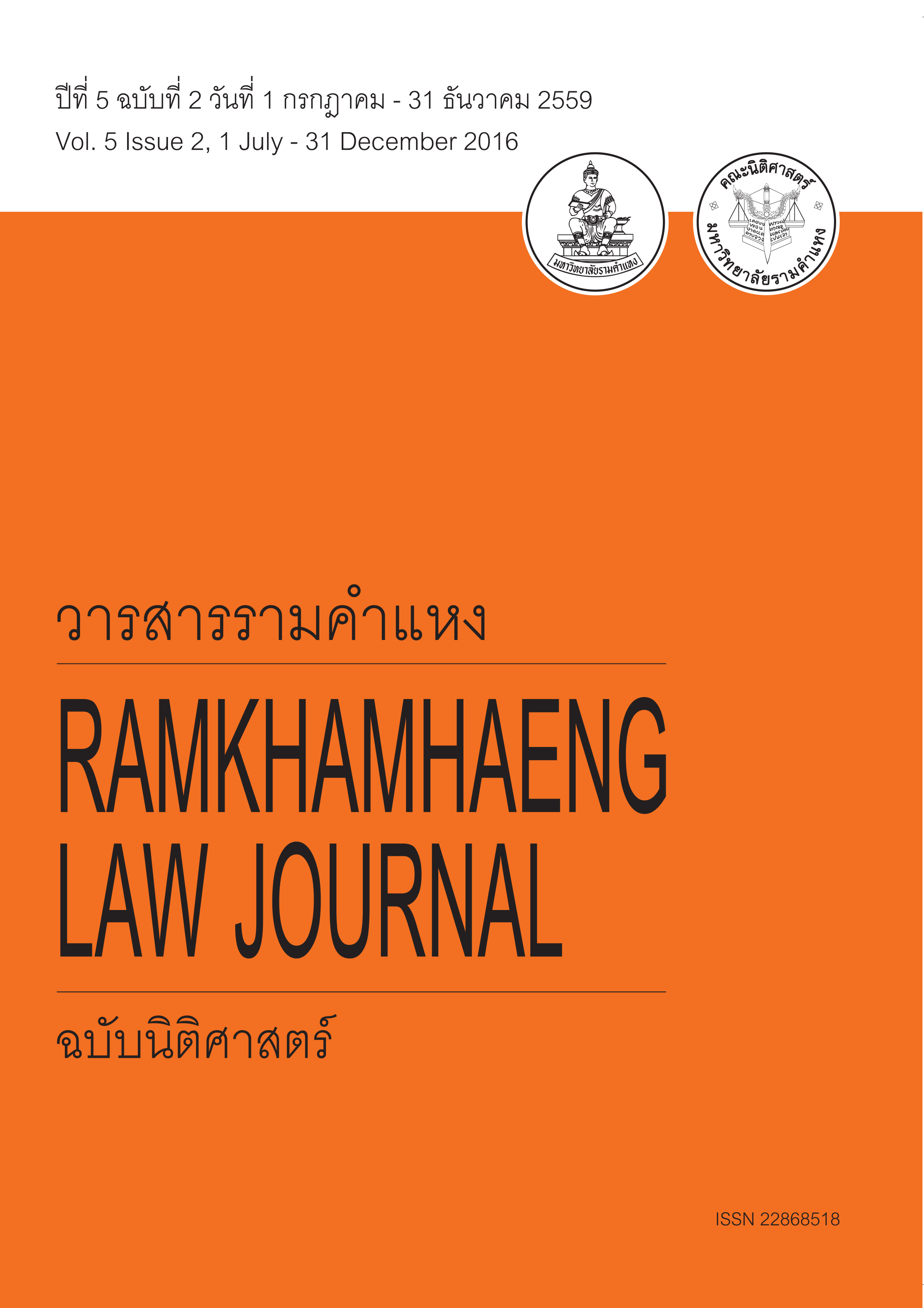ปัญหาภาษีอากรกรณีการกำหนดราคาตลาดภายในกลุ่มธุรกิจ สำรวจและขุดเจาะปิโตรเลียมในประเทศไทย
Main Article Content
Abstract
การจัดเก็บภาษีเงินได้ปิโตรเลียมจากธุรกิจสำรวจและขุดเจาะปิโตรเลียมในประเทศไทยอยู่ ภายใต้บังคับของพระราชบัญญัติภาษีเงินได้ปิโตรเลียม โดยรูปแบบการลงทุนของธุรกิจมักเป็นบริษัท ข้ามชาติและมักเกิดรายการค้าระหว่างบริษัทภายในกลุ่มเดียวกันหรืออาจเรียกได้ว่าเป็นคู่สัญญาที่มี ความสัมพันธ์กัน ซึ่งอาจทำให้เกิดการหลีกเลี่ยงภาษีอากรโดยการกำหนดมูลค่าของรายการระหว่างกัน หรือเรียกว่า “การตั้งราคาโอน” หรือ “การกำหนดราคาตลาด” ของรายการสินค้าและบริการ ระหว่างคู่สัญญาที่มีความสัมพันธ์กัน ในขณะที่ประเทศไทยไม่มีกฏหมายเกี่ยวกับการป้องกันการตั้ง ราคาโอนเป็นการเฉพาะ มีเพียงแนวทางการตรวจสอบภาษีของเจ้าพนักงานประเมินภายใต้อำนาจ ของประมวลรัษฎากรที่นำมาปรับใช้กับการตรวจสอบภาษีเงินได้ปิโตรเลียมทำให้เกิดความขัดแย้ง ระหว่างเจ้าพนักงานประเมินและผู้เสียภาษีอากรหลายประเด็น จึงเป็นที่มาของการศึกษาปัญหา ภาษีอากรกรณีการกำหนดราคาตลาดภายในกลุ่มธุรกิจสำรวจและขุดเจาะปิโตรเลียมในประเทศไทย จากผลการศึกษาพบว่าธุรกรรมระหว่างบริษัทภายในกลุ่มบริษัทของธุรกิจสำรวจและขุดเจาะ ปิโตรเลียมก่อให้เกิดปัญหาภาษีอากรสำคัญหลายประการ ได้แก่ ปัญหาการไม่มีบทบัญญัติกฏหมายเฉพาะเกี่ยวกับการกำหนดราคาตลาดภายใต้อำนาจของกฏหมายภาษีเงินได้ปิโตรเลียม วิธีการ คำนวณราคาตลาดที่เหมาะสมกับธุรกรรมที่เกิดขึ้นภายในธุรกิจนี้ การจัดทำเอกสารหลักฐานในการ พิสูจน์ราคาตลาด ตลอดจนปัญหาภาษีอากรระหว่างประเทศสำหรับฐานภาษีเงินได้ปิโตรเลียมที่ถูก ประเมินเพิ่มเติมภายหลังการตรวจสอบจากเจ้าพนักงานประเมิน ซึ่งควรได้รับการแก้ไขให้เกิดความ ชัดเจนและครอบคลุมเพียงพอเพื่อให้เป็นไปตามเจตนารมย์ของกฏหมายภาษีเงินได้ปิโตรเลียมและ ให้สอดคล้องกับการควบคุมการประกอบธุรกิจสำรวจและขุดเจาะปิโตรเลียมในประเทศไทย
Taxation Problem of Market Price Determination in Petroleum Exploration and Production Business Group in Thailand
Petroleum income taxation from businesses engaged in oil and gas exploration and production in Thailand is regulated by the Petroleum Income Tax Act B.E.2514 (1971). Multinational enterprises may form subsidiary companies and use the strategy of internal transactions to avoid payment of taxes by manipulating intercompany transaction values through the tactics of “Transfer Pricing” or “Market Determination Price.” Thailand has no specific provision to deal with transfer pricing prevention or auditing. There are only guidelines for audits done by the authority officer under The Revenue Code. Moreover, the adaptation of these guidelines by the authority office for Petroleum Income Tax auditing caused some conflict of interest issues between the authority officer and the tax payer. The study of this problem found that it may have been cause by intercompany billing. The major problems are: the lack of specific provisions for market determination or transfer pricing in the Petroleum Income Tax Acts; the lack of a suitable methodology for market price calculation; the problem of tax document preparation for proving the market price as evidence of Petroleum Income Tax; and Double Taxation in the Petroleum Income Tax, which may be caused by after-market price adjustments by the tax authority officer. These taxation problems should been solved clearly and appropriately, in ways that are consistent with the Petroleum Income Tax’s purpose of controlling the business of oil and gas exploration and production in Thailand.
